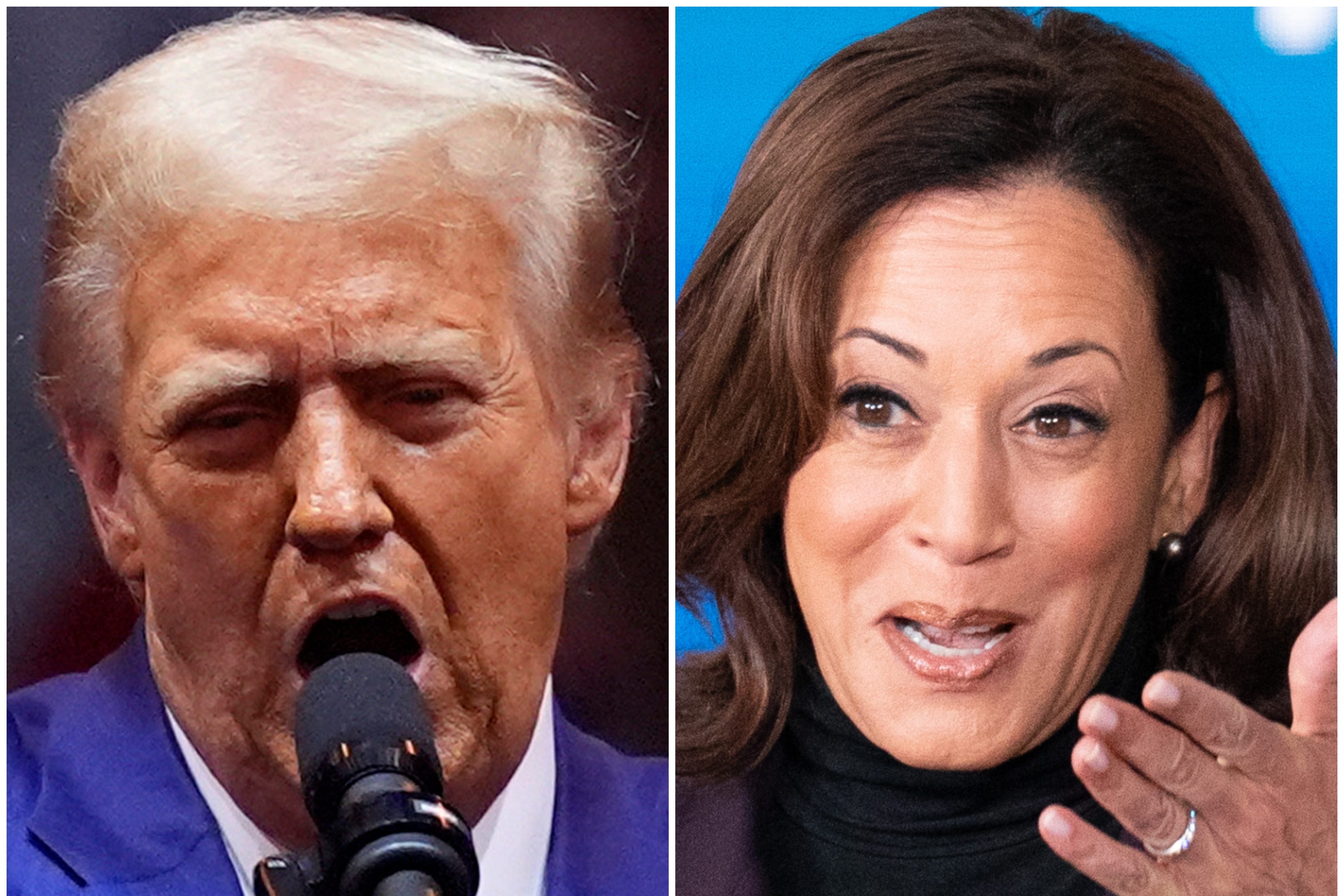UK watches on as neck-and-neck US election set to influence Britain’s future
Americans go to the polls on Tuesday in a presidential contest which is set to have a deep influence on Sir Keir Starmer’s Government.

Your support helps us to tell the story
From reproductive rights to climate change to Big Tech, The Independent is on the ground when the story is developing. Whether it's investigating the financials of Elon Musk's pro-Trump PAC or producing our latest documentary, 'The A Word', which shines a light on the American women fighting for reproductive rights, we know how important it is to parse out the facts from the messaging.
At such a critical moment in US history, we need reporters on the ground. Your donation allows us to keep sending journalists to speak to both sides of the story.
The Independent is trusted by Americans across the entire political spectrum. And unlike many other quality news outlets, we choose not to lock Americans out of our reporting and analysis with paywalls. We believe quality journalism should be available to everyone, paid for by those who can afford it.
Your support makes all the difference.Westminster watchers have turned their attention towards Washington as the UK braces for the outcome of the neck-and-neck race for the US presidency between Kamala Harris and Donald Trump.
Americans go to the polls on Tuesday in a presidential contest which is set to have a deep influence on how Sir Keir Starmer’s Government conducts itself on the world stage.
A Harris campaign win would be the favourable outcome for the UK, according to an expert on US affairs, while under a second Trump presidency the UK would be faced with a “tougher ask”.
The Republican candidate is likely to chart a new US course on major conflicts in Ukraine and the Middle East, areas where Sir Keir has largely followed the lead of US President Joe Biden.
“Donald Trump will have a much tougher ask,” Dr Leslie Vinjamuri of Chatham House told the PA news agency, claiming the Harris campaign would be a preferable partner to Sir Keir’s Government.
Dr Vinjamuri, the director at the influential think tank’s US and Americas programme, added: “I don’t think that he (Mr Trump) puts the same emphasis on the history of co-operation and partnership and alliance as we’ve seen from the current Biden administration, or as we would likely see from a Harris administration. He’s much more transactional.”
Mr Trump would likely push European Nato members to aim for 3% of GDP (gross domestic product) spending on defence, she told PA, an area where the UK is currently predicted to spend some 2.3% of GDP in 2024 while it grapples with ailing public finances.
Republican candidate Mr Trump is also likely to push for a peace deal between Ukraine and Russia, upsetting commitments by European leaders – including Sir Keir – to Volodymyr Zelensky’s war efforts.
Dr Vinjamuri said Mr Trump will also want to “play a significant role” in transforming the Middle East, likely in a strong pro-Israel manner that may clash with Sir Keir’s pro-Gaza leaning political base, as well as the UK’s stated position that a two-state solution is the preferred outcome to the conflict.
“The bottom line, if there’s a Trump administration, is on the security front there is going to be a demand to spend more and to line up,” Dr Vinjamuri said.
A Harris presidency would be more likely to value the long-standing UK-US relationship as “trusted allies”, the expert said, but added there was no guarantee she would be a continuity Biden figure due to the “transitional” period of conflict and turmoil across the globe.
Sir Keir has drawn ire of the Republicans in recent weeks. The Trump-Vance team has filed an official complaint with US federal electoral officials after reports that Labour Party officials met with the Harris campaign and volunteered for her.
The Prime Minister has insisted this is no different to similar co-operation in previous elections, and has sought to build links with both candidates, meeting with Mr Trump in New York in September.
Efforts to smooth over the relationship should Mr Trump win will unlikely be aided by a royal charm offensive, Dr Vinjamuri said.
“Trump had a deep affection and deep sense for Her Majesty the Queen, and that actually really mattered a lot. It helped a lot with the US-UK relationship,” she said.
She added: “There’s no sense of that continuing or being transferred to the King, which isn’t to say that Donald Trump has any antipathy, but there’s no apparent sense of just deep admiration in the way that he so clearly had for the Queen. And so you take away that kind of, that one thing that really did matter for Donald Trump, did sort of tame him, and I think it’s a very different proposition.”
Both Mr Trump and Ms Harris have made their final campaign push with American voters in so-called swing states such as Arizona, Georgia and Pennsylvania, where the race is expected to be close.
Under the US voting system, a total of 270 votes in what is known as the electoral college are needed to win the presidential election.
Ms Harris narrowly leads Mr Trump in the final prediction by YouGov ahead of the US election, with the pollster predicting she has 240 electoral votes, Trump 218, while a further 80 remain uncertain.
Key issues in the the race to be the next US president include security on the US’ southern border with Mexico, abortion rights, and reducing inflation.